This chapter will cover my (our) various activities from age about 27 to 37. So the major subjects covered will be moving house (twice), holidays abroad, our first cat, rock concerts, changing profession and anything else that comes to mind.
We had been living in our tiny flat in Hitchin for about a year and a half when the Stevenage Corporation told us that they had a house for us. It was a three bedroom terraced house at 18 Wisden Road in the Pin Green area of Stevenage (one of the better ones, I like to think). We arranged to go along and view it one evening, and were quite impressed with what we saw.
| At this point, I had better explain some of Stevenage's idiosyncrasies. It is a New Town, and, as far as possible, has been designed to keep pedestrians and cars apart. So most houses have a front door that opens onto the pedestrian system of walkways, and a backdoor that opens onto the road system. This can be confusing for tradesmen who don't like to knock on the back door and have to fight their way round to the front. There is also a system of cycleways, and what with all the roundabouts and underpasses, it looks quite different from most other British towns. |
You get to the back door down a little cul-de-sac and go in through a very small back garden that had been terraced on two levels (being on a slope). Beside the garden was the garage.
On the ground floor was a hall / corridor, a kitchen that wasn't all that much bigger than the one in the flat, a small dining room, a nice long living room with a big picture window, a downstairs toilet and a broom cupboard. Up the stairs were two big bedrooms and a much smaller third one, and a nice big bathroom. On the landing was the airing cupboard. Downstairs, in a cupboard off the hall, was the central heating system. It was an electrically powered storage system that fanned warm air through a system of vents into every room except the bathroom. (A little bit noisy, but quite efficient and easy to control.) There was also a small store room entered from the back garden. The views from the windows were mostly of other houses, especially in front where there were some tallish private flats. The people who were moving out had it decorated pretty reasonably, and we thought that we wouldn't have to do too much decorating for a time. Eventually all the formalities were completed and we picked up the keys. Well, it seems that the council had inspected the property and didn't like the decorating - so the previous tenants had painted the living room a dark green. We couldn't live with that so had to redecorate right away.
We moved in on the 18th June 1970 - it was the day of the General Election so we had to go back to Hitchin to vote (the Tories got in, I'm afraid). The rent was £27 per month (compared with £18 for the flat) and we had to spend more money on furniture - mostly on a circular G-Plan dining table with four chairs, and a sideboard (we still have them, though the chairs could do with re-covering). Carpets, curtains, lino and a single bed in the spare bedroom, plants for the garden all got purchased eventually - but our salaries had been slowly increasing and we just about managed it all.
The smallest bedroom was to become "The Study" with a little wooden desk painted bright yellow. I also wanted a large but cheap bookcase, and Alan Davies from work told me how he had made one from planks and bricks. So, I bought three sturdy planks of wood (about 7ft long by 11in wide by 3/4 in thick) and 36 decorative bricks (12 by 4 by 2 1/2 inches). I varnished the planks and then constructed the bookcase as follows. You lay three bricks on the floor up against the wall - one at each end of the bookcase and one in the middle. You then lay the first plank on this foundation. You then stack about half the remaining bricks above the first three and lay the second plank. You then stack the rest of the bricks and lay the top plank. I can be precise about the measurements because I have just measured it - I think that it will last for ever.
| One evening, we were watching the telly when, suddenly, there was our old flat! I think that it was one of Mike Leigh's short TV films, but I can't remember which one - I shall investigate. |
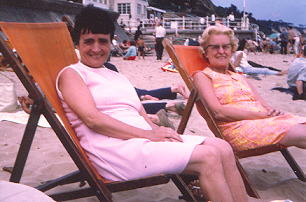
|
| Aunt Mary & Mum - Sandbanks |
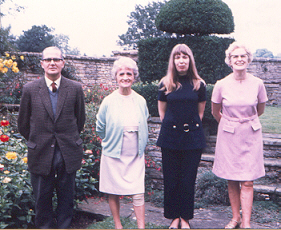
|
| Lez, Mary, Maureen, Mum - Tetbury |
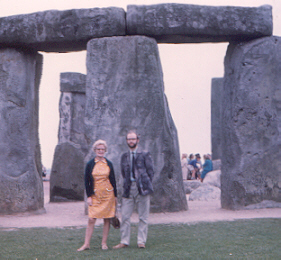
|
| Mum and Jeff - Stonehenge |
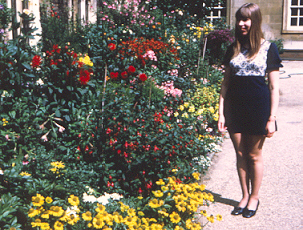
|
| Maureen (and mini) - Cambridge |
We couldn't afford holidays abroad yet, but we had a series of day trips, short holidays in the UK and visits to my mum in Bristol. Those that I can remember (and that I have slides of) include . . .
- 1969 - Sandbanks - this is near Bournemouth on the south coast - big sandy beach for a traditional seaside break.
- 1969 - Weston-super-Mare - this is the local seaside resort for Bristol - we took Christine and David and I have slides of them on the donkey carts (see previous decade).
- 1969 - Blaise Castle - the castle in this model village in Bristol is just an eighteenth century folly. The grounds are very pleasant though, with a water mill in a gorge.
- 1970 - Cotswolds - we took Aunt Mary, Uncle Lez and Mum for a spin through the Cotswolds - this is a range of hills to the north of Bristol - we visited a manor house and grounds near Tetbury.
- 1970 - Stonehenge - we visited this ancient monument when you could still walk around it freely. Notice how my animal skin coat blends in with the savage rock.
- 1970 - Brean - this is a long sandy beach just south of Weston - Brean Down is a rocky headland that sticks out into the Bristol Channel.
- 1970 - Kent - we toured around Kent by car - we stayed overnight at Battle (where the Battle of Hastings happened) and had a double bed and breakfast but only paid for a single (I didn't correct their mistake!) - we also visited Canterbury.
- 1970 - Whipsnade - this is a big zoo in Bedfordshire.
- 1971 - Clevedon - we took Christine and David to the seaside again - rock pools, narrow gauge railway.
At work, I was the organic lab's NMR spectroscopy specialist. For some people in other departments our machine (a 60 MHz job) was not good enough, and they had arranged to use a 220 MHz machine at a research institute (TNO) in Delft, Holland. Every month or two somebody took all the samples to be analysed and flew them over to Holland. One day it was my turn, so I had to get a passport organised. In those days, going on a business trip for Unilever was truly excellent. You were chauffeur driven to Luton Airport when the company plane was waiting for you - a Piper Aztec. This is a super little plane taking about half a dozen passengers and quite often you got to sit beside the pilot. Taking off in a small plane is really exhilarating - rather like being in a flying sports car. You fly quite low (about 5,000 ft I think) and the views are superb. Coffee was provided and you could help yourself from "the bar" (when somebody opens a bottle of Scotch in an un-pressurised plane, everybody knows about it!). Landing is always a little bit scary, and once we arrived back at Luton in a violent thunderstorm and the plane was being thrown all over the sky - a definite white knuckle ride. From Rotterdam airport you get the bus to the city centre and book yourself into the Hotel Terminus. All meals are provided and you just sign the bill - Unilever even provide you with spending money, and not one form to fill in. You then get the train to Delft and a taxi to TNO. Everybody speaks English perfectly (even the bus drivers) and they were a friendly bunch. If you were lucky, you would finish the work with time to spare and have time for some touristy things.
I did the trip at least five times from 1971 to 73, and it was in September 1973 that Maureen said that she would like to come along if possible - so I asked the lady in the office. "No problem" was the reply, "but you will have to fly by commercial airliner." They worked out what I would have to pay and provided all the tickets as usual. I think that we flew by KLM, but I can't remember from which airport - probably Heathrow. They had booked us into a different hotel in the town centre (instead of opposite the railway station). We had just gone to bed when there was a knock on the door - it was the envelope of spending money. The first day we both went to Delft together, I went to work as usual and Maureen had a lazy day in Delft. The next day Maureen caught the train to Amsterdam and had a good day visiting museums and going for a canal ride. I finished early and the third day we took a trip to Gouda and bought some of its cheese. We had added a couple of days holiday and we took in several art galleries and I can remember a huge Indonesian meal of lots of different little dishes.
One day in 1971, our next door neighbour knocked on the front door. She was holding a tiny black kitten that had followed her young son home from school. They already had a cat, so didn't really want a second - would we like him? Well, I didn't have any say in the matter - the offer was accepted like a shot. We weren't at all prepared for a cat so our neighbour gave us a tin of cat food and we put down a saucer of milk. The first night he was locked in the kitchen, with newspaper covering the floor.
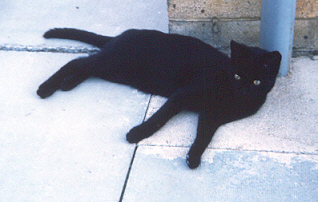
|
| Mr Baggins - Wisden Road - 1971 |
He was named Frodo Baggins, after the character in The Lord of the Rings, and we took him to the local vet for a check up. He later returned to the vet's for the dreaded operation - he didn't seem to mind. He quickly became part of the family and grew into quite an elegant little cat. The Frodo part of his name was quickly dropped and he became Mr Baggins.
We only had a small garden, so he took to roaming, and would stay out all night if he could. One morning he wasn't waiting on the doorstep when we got up and we couldn't find him anywhere. We were quite worried, and so we came home from work at lunchtime to search for him. I arrived first, and there he was at the front door - his paws coated with sand. The only sandy place nearby was along several footpaths and under an underpass into the local park where some work was being done. He was told not to do it again - but probably ignored us.
Of course, he slept on the bed with us at night, and had a very loud purr - at night it was like a motorbike in the room. One of his favorite tricks was to get on top of the wardrobe when you were asleep and leap onto you.
Like most cats, he was a bit choosy about his food. He mostly ate Whiskas tinned cat food and Purina "Dairy Dinner" packet food. The packet food was eaten so noisily that we called it "Crunchy Frog" (after some reference in Monty Python's Flying Circus). But above all he enjoyed Christmas. When the turkey was roasting he would prowl up and down so as not to miss it - he certainly got much more than his share.
At work it was getting obvious that I wasn't going to be promoted much above my lowly status. To get any higher you needed a post-graduate degree or preferably a PhD - too much hassle. Harold Wilson's Labour government had invented what it called a "University of the Air" - the Open University. This as a distance learning organisation - you get sent teaching material, there is backup material on TV and radio, and you are set assignments that are marked either by computer or by your tutor. I joined up, partly as a hobby and partly as a second string to my bow.
There were very few courses on offer at first and, anyway, you had to take a foundation course first - in either the Arts, Mathematics, Science, Social Science or Technology. I enrolled for A100 - the Arts foundation course. You got to study history, art, literature, philosophy and the like - it was quite a change. There was also a one week summer school - mine was held at the University of East Anglia near Norwich. Well I managed to pass OK, though not with flying colours.
The next year I took M251 - An Algorithmic Approach to Computing. Remember this was way before personal computers were ever thought of. After a slow start, I found this to be an incredibly interesting course. Also I was getting top marks consistently - I had taken to computing like a duck to water. To do any programming you had to visit the local technical college (in Hitchin) and use a teletype terminal. Programs were written in BASIC and saved onto punched paper tape. Needless to say, I passed that course with a distinction.
In subsequent years I took a range of different courses, mostly in mathematics, computing and science and eventually got my BA. But it was M251 that was crucial to my career.
As well as the Frythe, Unilever had research laboratories at Port Sunlight in Cheshire, and at Colworth House in Bedfordshire. One day they decided to have a tidy up and close the Frythe - we were all supposed to move or commute to Bedfordshire. Well, I didn't fancy that, especially as I was getting a bit dissatisfied with the job. I had a chat with the company's computing expert and she said "Try British Aerospace - they'll take anybody." So I wrote to BAe in Stevenage and got an interview. I was interviewed by a manager and then by a programmer / analyst, and had to take an aptitude test (it was a doddle). I was offered a job as a trainee computer programmer, but it meant a drop in salary. I took a gamble and accepted it.
All I can remember of my leaving do at the Frythe was Mick Whittal buying me too many Southern Comforts.
So, on 3rd December 1973 I started on my new career. Like all new trainees, I was put into a little team of trainees, probationers, and people that nobody wanted. I was given some training manuals to read, and exercises to work through. Then I was given a full scale program to write. The language used at BAe was COBOL - totally different from BASIC, but OK once you get used to it. To write programs then, you had to write out the instructions on a series of forms - these were given to punch operators who punched them onto cards, and these were sent off to be compiled overnight. The following morning you got back the listing of the program with a long series of error messages (mostly due to spelling mistakes). You corrected each card by retyping it on a little machine (or even a hand punch). You then waited another day for the next compile. Eventually the program compiled without errors and you got to actually execute it (also overnight). You then looked at the output and decided if it was OK - if not, you corrected the program and waited another day. This process took such a time that it forced you to be methodical in checking your program letter by letter.
For those of you who are interested in such things, the computing was done on an IBM system 360 model 158 mainframe. Files were held on IBM 3330 disks and there was massive use of tapes for backup and sorting. The operator's console was an IBM golfball typewriter! I think that the operating system at that time had recently been upgraded to OS/VS1 and they were proud of the fact that they could run more than one job at a time.
On April 1st 1974 I was promoted to Computer Programmer Grade 3 and was transferred to the Inventory Management team to do real work for the company. This team was also called Redfrock (because the system had been designed by Fred Rock). Steve Webb was the team leader and the only other programmer who I can remember was Sue Weston. The main file was a linked list of different record types, and updates were done by reading the current main file, updating the relevant records and then writing out a new main file - really traditional batch processing (now long gone).
My salary soon overtook what it had been back at the Frythe as I was promoted to grade 2 later that year, grade 1 in 1975, and Senior Computer Programmer in 1977 - I should have changed jobs years ago. I changed teams twice in this decade, but I'll tell you about that later.
A complete list of all the bands that we saw during this decade would be just too boring to contemplate. Also, I have forgotten most of them. Most of them, we saw with Bernard and Pamela Bushby. These days I am out of touch with pop music, but it is still one of Bernard's main interests and he has recently sent us his latest CD compilation (very professional). Here are just a few that stay in the memory.
- Late 60s? - we saw Fleetwood Mac at the Rainbow theatre in Finsbury Park (I think we also saw the Byrds but Maureen doesn't remember it)
- October 1971 - we saw the Everly Brothers at the Royal Albert Hall. They were what you would expect, but the warmup act was Loudon Wainwright III - I thought that he was great but the audience booed him off.
- Some time in the early 70s - Fairport Convention played a benefit concert for the local police in a field near Much Hadham. It cost us 5/- (that's 5 shillings) and was well worth it.
- December 1973 - we saw the Rolling Stones at the Empire Pool, Wembley. It was LOUD - I couldn't hear a thing for hours.
- December 1975 - we saw the Who (maybe my favorite band) at the Sundown cinema in Edmonton. Very fine.
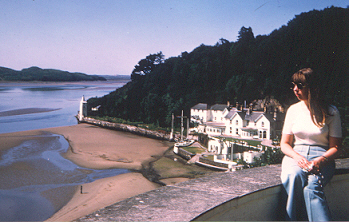
|
| Maureen - Port Meirion |
In June or July 1974 we had a holiday in Cornwall. We rented a flat for the week - but I can't remember exactly where. It rained almost constantly and, eventually getting fed up with watching the World Cup (football) on the telly, we came home early.
In September of the same year we had a short holiday in Madrid. We didn't speak much Spanish, but we had quite a good time.

|
| Maureen - Madrid |
In 1975 we went to the Rhineland of Germany. We stayed in Rudesheim - it's a pretty little town but quite noisy, and our hotel room was between a clock tower and the railway. The food was very substantial and the wine was quite pleasant if rather expensive.
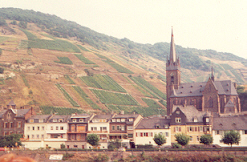
|
| On the Rhine |
Some time in 1976 we had a short break in the Cotswolds with Bernard and Pamela. We stayed in a hotel in Cheltenham - I don't know why, it wasn't very good. I can't remember us doing very much as Bernard was having problems with his brain (now fixed, I'm glad to say). We did visit the pretty little village of Bourton-on-the-Water. Pamela and I saw this posh Hotel / Restaurant called the Mance so we booked for dinner. It was very good but rather expensive I suppose. I annoyed the proprietor by saying that I liked the little prints on the walls - "They're not prints - they're Persian miniatures" - well, now I know.
I think that it must have been the November of 1977 when we travelled further than we ever had before, or than we have done since. We went to Las Palmas in the Canary Islands off the West coast of Africa. We stayed in a very reasonable tourist hotel and the food was pretty good - I can remember having Tortillas whenever they were available, and Creme Caramels for afters. We had a hair-raising coach drive over the mountainous hinterland and looked down into an extinct volcano. The beach wasn't up to much so we sunbathed on the room's terrace or on the roof.
Im August 1978 we stayed with my Mum for a week in Bristol and went for trips. Between us, we can remember Sheldon Manor, Hidcote Manor Gardens, Weston-super-Mare and Bath races.
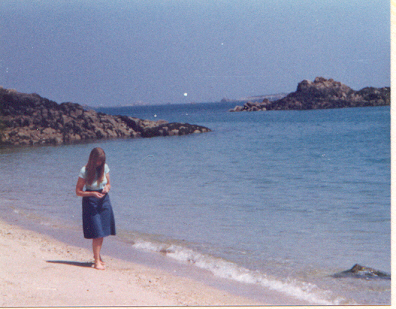
|
| Maureen on the Beach at Herm |
Our main holiday in 1979 was back to the Channel Islands - this time to Guernsey. We stayed in a very nice hotel, and hired a car for the week. The week was a good mixture of lazing on the beach and visiting tourist traps such as the Butterfly Farm. One day we had a trip to the little island of Herm - very charming. One of the guests in our hotel had chickenpox - Maureen got it the week after we returned, and I got it the following week.
I stayed in the Redfrock team at British Aerospace for several years. During this decade one of the biggest advance in computing was remote computing from video terminals. At BAe, these were first used by the punch-girls, who used a piece of software called Video/370 to input all the documents that had previously been typed onto cards. Later they were used by us programmers to write programs, and submit jobs to compile them - we used software called CRJE and, later, TSO. Soon we could edit and manipulate our files and program libraries, run jobs and look at the output - doing in minutes what used to take us overnight.
The second big development was the invention of databases - instead of simple files. At BAe, the Systems Programmers installed the IMS (Information Management System) from IBM. This was (is still) an integrated DataBase / DataCommunication system where multiple users' transactions are processed against multiple hierarchical databases in real-time. For a short history of IMS see this IBM Technical Note. As this was such a novel approach, a new programming team was set up for the first IMS project, and I was one of the programmers chosen for it. The application was a suite of programs to handle the procurement systems at BAe.
I had to go on a series of courses in London, and learn all sorts of new skills. The team leader was Geoff Owen, and other team members included Peter Day. The first project was sufficiently successful to enable IMS to become the only system that new projects were to use - as far as I know, most of them are still in use today.
In 1979, the Systems Programmer who looked after IMS left and they needed someone to replace him. I applied and got the job. This was with a small team of technical experts who looked after the mainframe's Operating System and other software (such as IMS). The team leader was Barry Chandler, and the other people were Ralph Dimelow (who I worked for), Robert Staddon and Keith Swain. I was to stay in this team for the whole of the next decade, and half of the one after - at the time of writing, Keith is the only one of the original team who still works there.
At some point, and for some long-forgotten reason, we decided that we wanted to own or own home (the Thatcherite dream!). We looked in several estate agents, and viewed several two- and three-bedroomed houses before deciding that we liked the look of one in Lonsdale Road. We visited it first on 16th April 1977, exchanged contracts on the 6th July, got the keys on the 5th August and moved in on the 9th August. Mr Baggins dashed down the front path and up a tree - "He likes it" we said. Over the following months we decorated various rooms, planted various plants in the (too) large garden and generally settled in. My mum came to visit us that Christmas. We had the kitchen totally overhauled, with proper units, cupboards, new cooker, washing machine and tumble drier. Some years later we had the house rewired and had to have the ancient central heating system replaced.
Sorry for the shortage (and poor quality) of pictures yet.